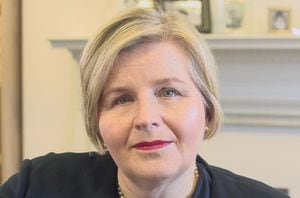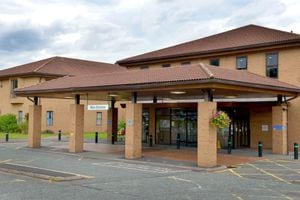Shropshire baby scandal: Mothers were blamed for loss of their children, review says
Grieving mothers being blamed for their loss and 'missed opportunities' to prevent serious harm are among a long list of failings that have been highlighted by a review into baby deaths at Shropshire's major hospitals.

The Ockenden inquiry into allegations of poor care at Shrewsbury and Telford Hospital NHS Trust (SaTH), has identified 27 local actions needed to improve maternity services, as well as seven which are recommended for across England.
The initial findings follow the review of 250 cases dating from 2000 to 2018, including the original 23 which initiated the inquiry back in 2017.
A report, published today by the review, was a "call to action" to see real change and improved safety in maternity services.

Explaining the findings, Donna Ockenden, chair of the review, said: “We are explaining in this first report local actions for learning and immediate and essential actions which we believe will improve maternity care, not only at this trust but across England so that the experiences women and families have described to us are not replicated elsewhere.
More:
"With a focus on safety, the 27 local actions for learning and seven immediate and essential actions in this report are ‘must do’s’ that need to be implemented now at pace.”
She thanked the families at the centre of the inquiry, adding: "This first review and all of our work that follows owes its origins to Kate Stanton Davies and her parents Richard and Rhiannon and to Pippa Griffiths and her parents Kayleigh and Colin.
"Kate and Pippa’s parents have shown an unrelenting commitment in ensuring their daughter’s short lives made a difference to the safety of maternity care.”
The report states that there were "missed opportunities to learn in order to prevent serious harm to mothers and babies".
The review team found that when serious maternity incidents were reviewed, the process was sometimes 'cursory'.

The report said: "The review team has also seen correspondence and documentation which often focussed on blaming the mothers rather than considering objectively the systems, structures and processes underpinning maternity services at the trust."
Examples of failure to learn lessons and implement changes in practice were highlighted, along with a tendency, until at least 2019, to regard problems at the trust as ‘historical’ or as a ’legacy’ from previous years.
One of the most "disappointing and deeply worrying themes" that emerged was the reported lack of kindness and compassion from some members of the maternity team at SaTH, which runs Royal Shrewsbury Hospital and Telford's Princess Royal Hospital and as a trust is in special measures.
The report said "inappropriate language had been used at times causing distress".
It added: "There have been cases where women were blamed for their loss and this further compounded their grief."
In one instance in 2011, the report said: "A woman was in agony but told that it was ‘nothing’; staff were dismissive and made her feel ‘pathetic’.
"This was further compounded by the obstetrician using flippant and abrupt language and calling her ‘lazy’ at one point."

It also noted that in many cases reviewed there appeared to have been little or no discussion and limited evidence of joint decision making and informed consent concerning place of birth.
In 2017, there was a case involving one woman who delivered in a stand alone birth centre and suffered a 'catastrophic haemorrhage' requiring transfer to the consultant unit, where she died.
The report said, according to her family, there had not been an explanation of the risks of birth in a midwifery-led unit, nor information on the need for transfer if complications arose.
Poor consultant oversight of mothers with high-risk pregnancies was also a concern in some cases.
According to a case in 2011, a woman developed severe high blood pressure and was managed on the labour ward.
There were delays in treating her high blood pressure and, following delivery, in seeking senior clinical advice, and she subsequently died.
Inadequate
The report also said there were "repeated failures" to escalate concerns for further opinion and review, problems in the interpretation of cardiotocograph traces and traumatic consequences of births using forceps – some which involved the baby suffering skull fractures and dying.
Several instances were noted where bereavement care was "inadequate or non-existent".
"Not only was bereavement care poor in a number of the 250 cases reviewed to date, there are also examples of completely inappropriate comments made to some family members after the loss of their baby," the report said.
"There are several examples where mothers say that they were made to feel responsible by trust staff for the loss of their babies."
The review team said there was a clear impression that a culture existed within the trust to keep caesarean section rates low, and concerns have been raised over the use of oxytocin – an intravenous infusion commonly used in obstetric labour wards to increase the frequency, strength and length of uterine contractions.
To improve the safety of services at SaTH, the review recommends greater consultant oversight of maternity care and appointing lead obstetricians and midwives with expertise in fetal monitoring and bereavement care.
Other recommendations include ongoing risk assessment for all women and greater involvement from obstetric anaesthetists when women have complex pregnancies or become ill.
In addition, a further seven 'immediate and essential actions' have been made which not only apply to SaTH, but also maternity services across England.
In a letter to Health Secretary Matt Hancock, Ms Ockenden wrote that "neighbouring trusts and their maternity services must work together with immediate effect to ensure that local investigations into all serious incidents declared within their maternity services are subject to external oversight by trusts working together".
She said had a similar structure of partnership working been in place, SaTH would have been alerted much earlier for the need to scrutinise its governance processes and learn from its serious incidents.
Continue
Following the launch of the Ockenden inquiry by then Health Secretary Jeremy Hunt in 2017, the number of cases being considered has risen from 23 to 1,862, with the majority of incidents occurring between the years 2000 to 2019.
The full and long-awaited report by the inquiry team is expected next year.
Ms Ockenden said the first report was "by no means the end of the journey".
She said the independent review will continue working with NHS England and Improvement, the Department of Health and Social Care and the trust as it continues with its improvement plan to ensure these changes are being actioned.
She said the team would also be examining the trust's governance structures and decision making processes, as well as considering the views of staff.
"I'm very confident the trust is committed to this journey of improvement," Ms Ockenden said.
"It may be when we have looked at all of the cases that we strengthen those immediate and essential actions."





